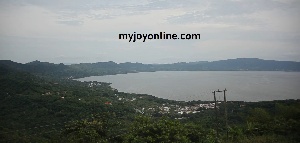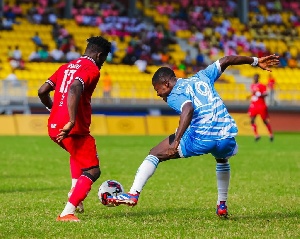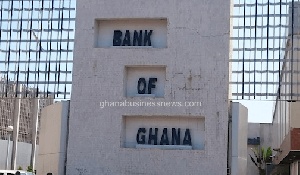Regional News of Thursday, 17 April 2025
Source: www.ghanawebbers.com
Declare a 'state of emergency' over Lake Bosomtwe to save it from drying - Scientists appeal to Asantehene
Scientists at the University of Energy and Natural Resources have made a plea. They want the Asantehene to declare a 'state of emergency' for Lake Bosomtwe. Human activities are causing the largest natural lake in West Africa to dry up.
A study by local and foreign scientists found that the lake has receded over 100 meters in 20 years. This change threatens aquatic life and has reduced the lake's size by nearly two football pitches.
Lake Bosomtwe was formed by a meteorite about 1.2 million years ago. It is roughly 8 kilometers wide, covering an area of about 52 square kilometers. However, its depth has decreased from 800 meters to a maximum of 78 meters.
The surface area shrank from 52 kilometers in 1986 to just 46 kilometers in 2020. Researchers from UENR, the University of Ghana, and two foreign institutions have studied the lake for two decades.
Their project, “Building Resilience of Lake Bosomtwe to Climate Change” (RELAB), found that fish stocks have declined significantly. This reduction means fewer catches for local fishing communities who rely on this resource.
Climate change and harmful human activities are blamed for these issues. These include poor farming practices and increased development near the lake.
Dr. Peter Sanful, project coordinator, expressed shock at how quickly the lake is receding. He noted that he saw water covering certain areas just five months ago.
Traditional authorities were surprised during a meeting with scientists about the lake's recession. Nana Adomako Pemsan, a local leader, partly blames traditional leaders and residents near the dam for this issue.
He highlighted that private developers are destroying buffer zones around the lake. In his youth, there was minimal development around Lake Bosomtwe; now it is heavily developed.
Dr. Sanful emphasized urgent action is needed from Asantehene Otumfuo Osei Tutu II regarding human activities harming Lake Bosomtwe. He pointed out that climate change impacts are worsening conditions for local communities.
He called for serious attention to be given to Lake Bosomtwe as it is vital to Ashanti people’s heritage. Dr. Sanful urged declaring a state of emergency to unite stakeholders in addressing these critical issues.
The RELAB project aligns with Goal 2 of the United Nations Sustainable Development Goals, aiming to end hunger while promoting food security and sustainable agriculture.











